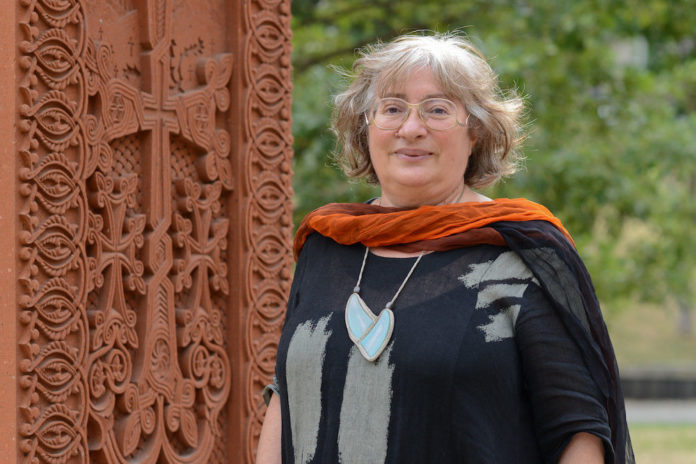
Prof. Dr. Armenuhi Drost-Aberjan
Petitions, Calls for
Political Mediation Continue
by Muriel Mirak-Weissbach
BERLIN, NOVEMBER 5, 2020— As the war in the South Caucasus enters its second month, Armenian organizations in Germany are redoubling their efforts to urge government authorities in Berlin and in Europe to finally take effective action.
The Central Council of Armenians in Germany (ZAD), the Diocese of the Armenian Church in Germany, the German-Armenian Society (DAG) and the German-Armenian Lawyers Association (DEARJV) issued an appeal on October 21, addressed to all members of the German Bundestag (Parliament). In three main points the groups demanded immediate humanitarian aid for the people in Karabakh, to lessen their suffering; clear denunciation of Azerbaijan’s responsibility for the current developments, instead of “balanced“ declarations; and, abandoning silence to address the role of Turkey, as other countries have already done (France, the US, Russia and Canada). Finally, the German Federal Government should see to it that Turkey no longer be co-chairman of the Minsk Group.
A week later a debate in the Bundestag took place, on the “Peaceful Solution for Karabakh“ during which these points were discussed. The initiative generated interest on the DAG’s website, with 65,000 persons reached, and was echoed in the press.
The German-Armenian Lawyers Association, at the same time, took the bold step of reporting the events officially. On October 20, it filed a criminal complaint to the Federal Prosecutor General at the Federal Court of Justice in Karlsruhe, for war crimes by Azerbaijani soldiers. Making reference to photographic documentation, the complaint listed torture, the use of cluster bombs, shelling of civilians and civilian sites like hospitals, kindergartens, schools, cultural centers, theatres and churches, as well as civilian infrastructure. The document noted, “Under universal jurisdiction, criminal prosecution in the Federal Republic of Germany is also possible if the offence was committed abroad and the perpetrator is located in Germany after the crime.“ It cited a precedent for the case.
Prominent intellectuals also came together to add their voices to the demands for political intervention. They addressed their petition to the leading political representatives of the German Federal Republic, beginning with President Frank-Walter Steinmeier, and including government ministers, relevant parliamentary committees, members of the European Parliament and the Bundestag. The call came on the 30th anniversary of an appeal issued by 126 leading scientists, writers, artists and politicians, among them, Hans-Georg Gadamer, Jügen Habermas, Jacques Derrida and Isaiah Berlin; at that time, on July 27, 1990, members of the international academic elite had urged immediate measures to guarantee the security of Armenians in the South Caucasus. The earlier initiative had recalled that 70 years after the genocide, a half century after the Holocaust and 40 years after the declaration of human rights, one must not allow human rights violations to be covered in silence or a second genocide against the Armenians to occur.
Now, 30 years later, the group of colleagues from the academic world in the fields of Near East, Caucasus and Armenian Studies, express their deep concern and shock. In the shadows of the Corona pandemic, they write, a modern war is raging, with deployment of Islamist mercenaries, who are threatening the lives of innocent people, as well as a thousand-year-old Armenian cultural landscape.
Alarmed that the Minsk Group’s call for a ceasefire and return to negotiations has yielded nothing, the academics warn of an impending humanitarian disaster, with mass refugee flows. Colleagues and students in the universities in the region are endangered, as heavy bombs have targeted Stepanakert. Cultural treasures and valuable medieval manuscripts, preserved in the monastery libraries of Artsakh are not safe. Not only Artsakh, but also the territory of the Republic of Armenia is threatened, they write, where archaeological and geological excavations have been taking place, as a collaborative effort among the countries they represent.
Finally, the group expresses concern that the conflict will spill over into Germany, where Armenian properties have already been attacked.
Offering their expertise to help find solutions to the complex conflict, the academics demand “effective mediation between the two sides to end this armed conflict.“ The preconditions listed are: immediate cessation of hostilities; an end to weapons deliveries to both sides; protection for civilians on both sides; protection of historical monuments; respect for the right to self-determination of the various ethnic groups; and, a peaceful political solution that takes this into account.
The text closes with reference to the independence declaration of the Autonomous Republic of Berg Karabakh following the collapse of the Soviet Union, and the words of nuclear physicist and Nobel Prize winner Andrei Sakharov, who endorsed the self-determination of the Armenian people. The signatories demand mediation in the conflict and recognition of the right of the Armenian people in the Republic of Artsakh to self-determination “as the only guarantee for its existence.“
The initiators of the call are Prof. Dr. Armenuhi Drost-Aberjan, Mesrop Center, and Prof. Dr. Carola Horn, Seminar on the Christian Orient and Byzantium, both of the Martin Luther University in Halle-Wittenberg. Co-signers include a long list of academics and prominent personalities.